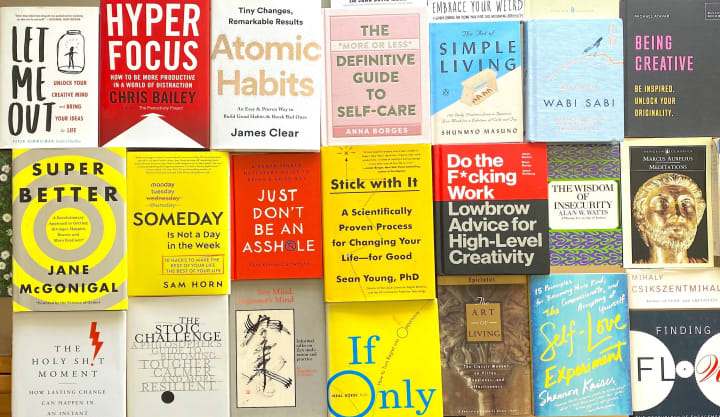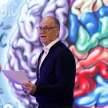
If you’re looking for self-help, why would you read a book written by somebody else? That’s not self-help. That’s help! There’s no such thing as self-help. If you did it yourself, you didn’t need help.
George Carlin
I don’t know about you, but I love self-help books and I also hate them.
They offer promise, hope, transformation, a better life, better relationships, fulfillment, optimization, personal development. All I have to do is follow these simple steps, put my request out to the universe and wait, and wait. I’ve done the exercises, worked the worksheets, delved deep into my soul, focused my mind, and…nothing. No change, no transformation. I haven’t made it to the two-comma club, what am I doing wrong?
[The 15 best-selling self-help books of all time].
What I have found out is that my life is lacking fulfillment, I don’t have or can’t find, the qualities I should be able to find and I have more short-comings than I was aware of before I started, or that actually exist. I didn’t know that I had so much untapped (and inaccessible) potential. I’m not sufficiently optimized. What I need is the next self-help book which will show me what I was doing wrong.
The desire for a more positive experience is in itself a negative experience. Yet the acceptance of one’s negative experience is itself, a positive experience. The practice of self-help only highlights the qualities and things we don’t have, and, as a result, end up making us less satisfied than we were before. The opening of the desire mechanism may be feeding the self-help book industry more than it’s helping me.
The key to why self-help books are so successful is that they never fully deliver, they leave you wanting more (probably the next book).

Most start by showing you what is missing in your life, they identify your pain points, you feel inadequate and un-optimized. Then they sell you the solution. We find fears and desires that we never knew existed. We visualize our life as it might be, we dream dreams. We just have to close our eyes and visualize it, really visualize it, send our message out to the universe and wait for the response. Our prayers will be answered. It’s the “Universal Law of Attraction”. What you desire, if you can picture it, feel it, and “become” it, will return to you in abundance.
When it doesn’t quite materialize, that’s because we haven’t seen it or felt it clearly enough, or we weren’t sincere enough in our request. We must believe absolutely, profoundly, and sincerely.
The parallels between self-help and religion are obvious, all that’s lacking is the power and authenticity of the narrative. Once we convert knowledge and information into belief, it becomes a self-fulfilling prophecy. We don’t see the world as it is, but as we are. “We become what we think about.” (Napoleon Hill, The Strangest Secret).
Is this a reflection of our times, a new religion?

Well, not so new. Self-help books, guru teachings, shamanic advice on how to improve yourself have been around since the dawn time.
Cicero’s “On Friendship” and “On Duties were used as handbooks for centuries. Ovid wrote “Remedy of Love” and “Art of love” which dealt with practical, everyday problems, like how to meet girls, how to keep them interested, and how to be sociable rather than athletic in bed.
In 1859 at the same time as Charles Darwin published “The Origin of Species” and John Stuart Mill’s published “On Liberty,” Samuel Smiles published “Self-Help”, probably the first self-proclaimed self-help book. Based on the premise that “Heaven helps those who help themselves” and “never say die,” the book promoted the idea of self-empowerment in an age where industrialization, free trade capitalism, the abolition of slavery, and colonization were persuading a new breed of entrepreneur and a new class of people, eager to better their status and situation.
In 1920 Emile Coué published “Self-Mastery Through Autosuggestion” based around his research into hypnotism, suggesting that repeating mantras to yourself would have a positive effect on your subconscious mind. This resonated sufficiently to spark the New Thought Movement which coupled their beliefs, Coué’s autosuggestion, and contemporary advances in scientific research, into a new belief that positive thoughts bring positive experiences and negative thoughts bring negative experiences. The power of positive thinking and mind over body. If we can control how we think, we can control our behavior and our lives. The new opportunities, mobility of the classes, and potential success motivated a generation to feel empowered and more in control of their destinies.

This reflection of the popular zeitgeist continued into the 1930s which, during the Great Depression, saw the advent of Napoleon Hill’s “Think and Grow Rich,” inspired by Andrew Carnegie, who advocated that desire, faith, persistence, and control of our thinking would yield success. Success, was within our control if we could just achieve the right thinking. At about the same time, in 1936, Dale Carnegie published “How To Win Friends and Influence People.” Both books are still in print and have sold millions of copies.
This concept of the power of positive thinking gained further traction in the 1950s and reflected the growth of religion, particularly in the USA. Praying was applied to weight loss, dating, and personal development. Further endorsed by Earl Nightingale’s “The Strangest Secret” which took a spiritual view of personal development and success, quoting from lessons contained in the sermon on the mount and using the imagery of the farmer sowing and nurturing his fields. “You Reap What You Sow”, “Ask, and it shall be given to you” “Seek, And Ye Shall Find” “Knock, And It Shall Be Opened Unto You”… Success is now defined as “… anyone who is pursuing deliberately a predetermined goal.” If we set our goals, if we control our thinking, the rest will follow.
“We Become What We Think About”
The 1960s and ’70s saw the explosion of eastern cultural influence. We saw this in music, art, and writing. An age of identity searching, saw the advent of Self-realisation and self-fulfillment, coupled with pseudoscience, saw the shift towards a more personal, spiritual experience with the mixing of eastern and western philosophies and new-age spirituality. Again, following the zeitgeist of the times.

The explosion of TV in the 1980s and ’90s saw the rise of celebrities like Tony Robbins and Oprah Winfrey, whose personal charisma enticed millions of viewers to become devotees and followers. The self-help industry exploded. Now we could see our Guru’s as well as read them.
The internet and the cult of celebrity fuelled the self-help industry into overdrive. Having viewed, in minute detail (supposedly) the lives of celebrities and influencers, we wanted a piece of the action and our way into the power, status, wealth, and self-optimization was via emulation of their habits and lifestyle. Further fuelled by the American Dream of equality of opportunity, available to any American, allowing that the highest aspirations and goals to be achieved. A lifestyle choice.
The result, underwritten by the social media frenzy, is anxiety, depression, and FOMO, a Fear Of Missing Out. It’s a powerfully concocted mix of aspiration, desire, and belief that most of us do not achieve, but constantly attempt to realize. But the self-help industry, with the additional channels of the internet, is thriving as we are striving. Self-help publishing has nearly doubled since 2013 reaching 18.6 million copies sold in 2019.
If there were such a thing as a cognitive bias for over-estimating the possibilities of change, then I have it in spades. Self-help books offer a simplification of a highly complex existence. Whether it’s Tim Ferris in his “4 Hour Work Week” or Marie Kondo’s “KonMari Method” People are yearning for meaning, peace, and calm in today’s chaotic culture—and they’re looking for ways to slow down and unplug, which is part of the reason books that inspire people to do just that are doing well.

However, we now have the Anti-Self-Help, Self-Help book. Publications like “Girl, Stop Apologizing,” by Rachel Hollis, and “The Subtle Art of Not Giving a F*ck,” by Mark Manson, are propelling growth in this area. It’s Ok to be mediocre and negative, we are all overwhelmingly average, and that’s OK. We can accept ourselves as we are and if we stop feeling that we need to be something other than what we are, we can be happier. Perhaps this is also a reflection of our times.
Ultimately, it seems that we are sold self-help in order not to open our minds (although sometimes it does) but to open our wallets. It’s a very lucrative business if you get it right, but that, of course, attracts a lot of cut-and-paste self-helpers.
We’ve fallen prey to a marketing phenomenon of our times, and the result is dissatisfaction, angst, and FOMO. We’ve invented shortcomings that we didn’t even know we had or existed. Yet we believe. We believe because that’s what we’ve been primed to do. We can refashion our individual selves, even if that means admitting that we are average.
You can’t become a concert violinist with a 6-week self-help book.






Comments
There are no comments for this story
Be the first to respond and start the conversation.